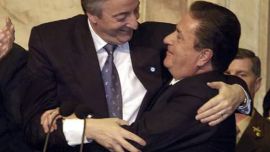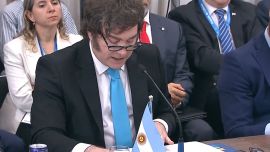Argentina’s consumer prices slowed on a monthly basis during President Javier Milei’s first full month in office as he continued to implement parts of his shock therapy economic plan.
Inflation cooled to 20.6 percent in January from a month earlier, slightly below economists’ expectations of 21 percent. From a year ago, prices accelerated 254.2 percent, the fastest pace since South America’s second-biggest economy exited hyperinflation in the early 1990s.
Since taking office December 10, Milei devalued the peso 54 percent and removed price freezes on hundreds of household essentials. Goods and services drove price hikes in January, followed by transport. Prices are expected to keep climbing on an annual basis as Milei slashes energy and transport subsidies and bumps up fuel taxes to comply with his goal of closing a gaping budget deficit, even after his sweeping omnibus bill fell flat in congress. Buenos Aires City is set to raise subway fares sixfold by June, according to the city government.
The unwinding of generous subsidies set by the previous government and sharp contraction in economic activity are key tenets of Milei’s economic plan to rein in galloping inflation, which he warned would be Argentina’s “last bitter pill” in his inauguration speech. The loss in spending power will also ratchet up the stress on a nation already beleaguered by poverty levels above 40 percent. In December, salaries posted a meagre 8.9 percent monthly increase, far below the 25.5 percent inflation for that month.
On Wednesday morning, former Argentina president Cristina Fernández de Kirchner, who sits on the polar opposite end of the political spectrum from Milei, posted a scathing 33-page letter on X criticising Milei’s government.
Fernández de Kirchner maintains that Argentina’s inflation is the product of excessive foreign borrowing, not the budget deficit or monetary financing diagnosed by Milei.
The former vice-president warned Milei’s plan would cause an increase in unemployment and social desperation “in a sort of planned chaos.”
Retail sales took a brutal 28.5 percent plunge in January compared with the previous year, with the greatest cuts in consumption of food and drink and pharmaceuticals, according to the Argentina Confederation of Medium Companies, or CAME.
The International Monetary Fund projects a 2.8 percent contraction in Argentina’s economy in 2024, followed by five percent growth in 2025.
related news
by Manuela Tobias, Bloomberg





















Comments